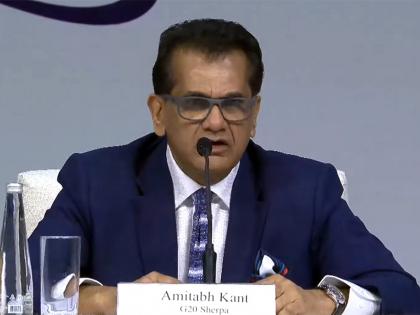Divided Group of 20 was unacceptable, consensus was the only way forward: Amitabh Kant
By IANS | Updated: September 26, 2023 14:10 IST2023-09-26T14:06:28+5:302023-09-26T14:10:08+5:30
New Delhi, Sep 26 The Indian government was steadfast in its view that a divided Group of 20 ...

Divided Group of 20 was unacceptable, consensus was the only way forward: Amitabh Kant
New Delhi, Sep 26 The Indian government was steadfast in its view that a divided Group of 20 was unacceptable, and that consensus was the only way forward, Amitabh Kant, India’s nodal official for the G20 Summit in Delhi, said this in an interview with IANS.
Excerpts of interview:
IANS:The Group of 20 reached a consensus on the“leaders’ declaration”by thefirst day of the summit in New Delhi, defying predictions to thecontrary. The text does not mention “Russian aggression against Ukraine”or the “demand for Russian withdrawal from Ukrainian territory” unlikelast year’sBali declaration.Can this year’s G20 communique be interpreted as a major concession to Russia with regard to the war?
Amitabh Kant:The language adopted in the New Delhileaders’declarationgoes beyond Bali. Wehave reaffirmed that all states must act in a manner consistent with thepurposes andprinciples of the UNcharter in its entirety. Furthermore, inline with theUN charter, all states must refrain from the threat or use offorce to seek territorial acquisition against the territorial integrity andsovereignty or political independence of any state.
Wehavereiterated that G20isnot the forum to resolve geopoliticaland security issues. Yet, wealsoacknowledged that geopolitical issuescouldhave significant consequences for the global economyandhighlightedthe human suffering of the war in Ukraine, with regard to globalfood and energy security,andinflation and growth, especially indeveloping andtheleast-developed countries.
The language welcomes all relevant and constructive initiatives thatsupport a comprehensive, just and durable peace in Ukraine that upholdsall thepurposes andprinciples of the UNcharter.
IANS: The documentseems to bein line with China’s position - one,thatRussiais notcalled the aggressor; and two, the use or threat of use of nuclearweapons is unacceptable. Is the communique a gain for the two countries evenas their top leaders were absentatthe summit and a step back for theWest?
Amitabh Kant:TheNew Delhileaders’declarationis not just a gain for a few countries, but rather all G20countries, and indeed the world. Itcontainsbalancedparagraphsthatarenot divisive and should beseen in the global context. It addresses conflicts across the world and the human suffering and economic impacttheycause.
The issue of Ukraine is addressed front and centre. In fact,the issue isaddressed in much stronger language than Bali.
We have brought to the fore issues of great concern to theglobalsouth,whether around growth,the sustainable development goals (of the United Nations), energy transitions andclimate finance,amongothers. These are transformative actions, with the potential to liftmillions out of poverty, while driving climate action. Even though theleaders of China and Russia senttheirrepresentativestothesummit,bothcountries were actively involved in the 200-plusmeetings in the run-up to the summit. As with other countries, the views of China and Russiahave been reflected in the document.
IANS:Howdid the Group of Seven countries, the European Union and other G20members (besidesChina and Russia) come around to accept thedocument’s wording on Ukraine after their long-held positionson Russiasince the invasion in February 2022?
Amitabh Kant:As I mentioned earlier, all countriesagreethat G20 is not theforum to resolve geopolitical and security issues.Butthe impactisbeing felt globally through food and energyprices. Being the premier forum for global economic cooperation, our language points out clearly the impactofthe war on the global economy, especially on developing andtheleast-developed countries.We have also called for full, timely and effective implementation ofinitiatives toensure unimpeded deliveries of grain, foodstuff,fertilizersorinputs from both Russia and Ukraine.
IANS: Some analysts said earlier thatChina-ledforums such as BRICS andtheShanghai Cooperation Organisationwouldbecome more appealing tocountries--especiallywithregard tofinancing in the developing world--than G20 ifdivisions withinwerenotresolved?Was that whytheUS anditsWestern allies supportedIndiaon theoverall summit success?
Amitabh Kant:Developing countries working together was crucial in drivingaconsensus atthe G20summit. As the president of G20(currently India), we were also steadfast in our viewthat a divided G20 was unacceptable, and consensus was the only wayforward. China is a multilateralplayer and very much supported us in thisendeavour.
IANS:Some see the newly announced India-Middle East-Europe economiccorridor as apotential alternative to China’s decade-old Belt and RoadInitiative. Would India still have beenonboardthe West Asia project if theUS andtheEuropean countries had not agreed to the G20 leaders’declaration in a way that was also acceptable to China and Russia?
Amitabh Kant:Multilateral negotiations such as these happen in parallel, with countrieskeeping national priorities and interests in mind.Butissues such asdevelopment, job creation, infrastructure development and sustainabilityare goals common across governments. Through boosting connectivity and trade, the India-Middle East-Europe economic corridor can have atransformative impact, which is why countries have signed on to it. It isalong-term visionary project and will have a transformative impact.Aswere the negotiations at G20, on for instance, the green developmentpact. Action on issues such as energy transition, ecosystem restorationandclimate finance, among others,form a core part of theNew Delhi leaders’ declaration. Throughnegotiations, we aimedto align incentives, creating scenarios acceptable toall countries.
IANS:Did the Ukrainian government make any request to the Indian governmenttoenableUkrainian President Volodymyr Zelenskyyto deliver aspeech at theDelhisummit (via video) as he had done at the G20 Bali meeting or hisgovernment’s participation as an invitee to thisyear’ssummit?
Amitabh Kant: Participation at G20(summits)is for members of the G20, along with inviteecountries and international organisations. We issued invitationsto thecountries and IOs as soon as we assumed the G20 presidency inDecember. We were very clear that we wanted to focus on growth anddevelopment issues which impact the global south.
Disclaimer: This post has been auto-published from an agency feed without any modifications to the text and has not been reviewed by an editor
Open in app